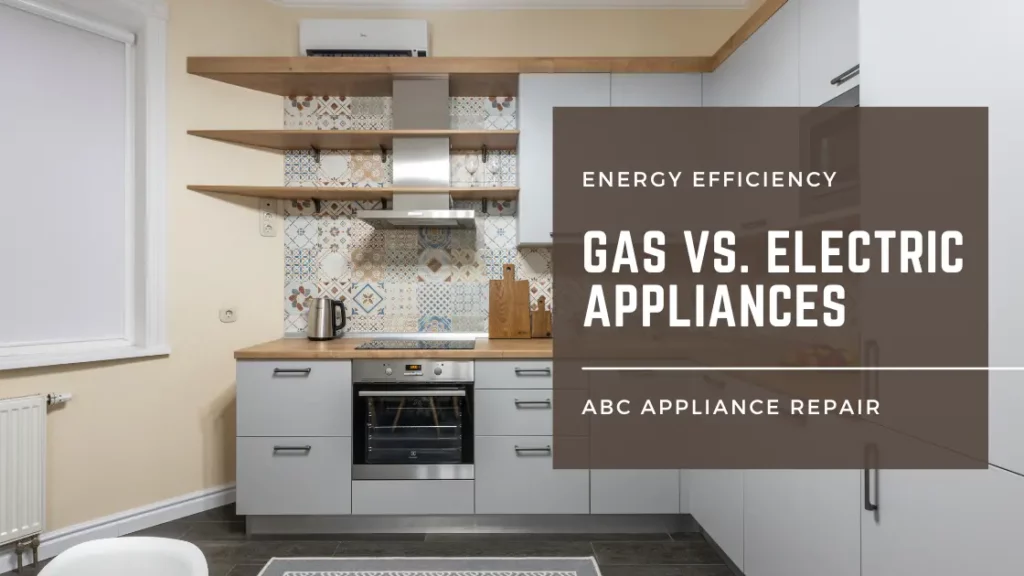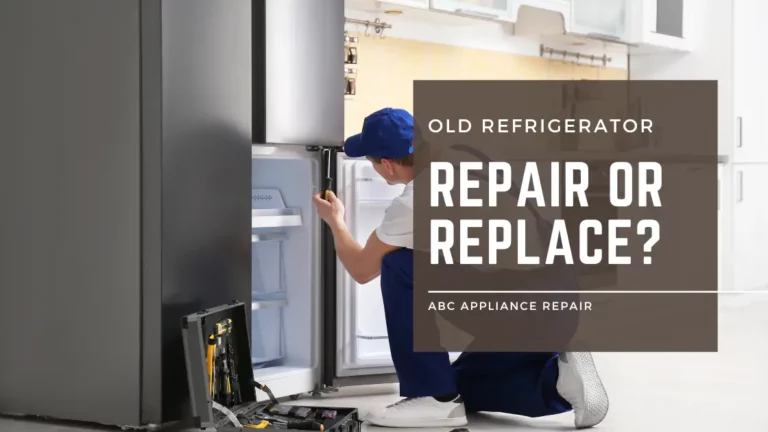In today’s world, where energy consumption and environmental impact are major concerns, the importance of energy efficiency in household appliances cannot be overstated. Choosing the right appliances can significantly impact both our utility bills and the planet.
This blog post aims to explore the energy efficiency of two popular choices – gas and electric appliances, helping you make an informed decision that aligns with your needs and priorities.
Understanding Energy Efficiency
Before delving into the +comparison, it’s crucial to understand what energy efficiency means and why it matters. Energy efficiency refers to the ability of an appliance to perform its intended function while consuming the least amount of energy. This not only saves money on utility bills but also reduces overall energy consumption, leading to a greener and more sustainable environment.
When comparing the energy consumption of gas and electric appliances, it’s important to note that gas appliances use natural gas or liquefied petroleum gas (LPG) as fuel, while electric appliances rely on electricity to function.
Gas Appliances: Pros and Cons

Advantages
- Lower Operating Costs: Gas appliances typically have lower operating costs compared to their electric counterparts. This is mainly due to the lower cost of natural gas or LPG compared to electricity rates.
- Instant Heat: Gas provides instant heat, making it a preferred choice for cooking and heating purposes. Gas stoves respond quickly to adjustments in temperature, giving you more control over your cooking.
- Reliable Performance: Gas appliances continue to function even during power outages, ensuring uninterrupted access to essential services like cooking and heating.
Disadvantages
- Limited Availability: One of the primary drawbacks of gas appliances is their limited availability in areas without access to natural gas pipelines or a reliable supply of LPG.
- Higher Upfront Costs: Installing or converting to gas appliances may involve higher upfront costs compared to electric appliances.
- Safety Concerns: Gas appliances come with potential safety concerns related to gas leaks or carbon monoxide emissions, emphasizing the need for regular maintenance and safety checks.
Electric Appliances: Pros and Cons

Advantages
- Wider Availability: Electric appliances are more widely available and suitable for areas without access to natural gas supply.
- Lower Upfront Costs: Electric appliances generally have lower upfront costs for installation compared to gas appliances.
- High Energy Efficiency Potential: With advancements in technology and newer models, electric appliances can achieve high energy efficiency levels.
Disadvantages
- Higher Operating Costs: Electric appliances tend to have higher operating costs due to the relatively higher electricity rates.
- Slower Heat Response Time: Electric stoves, for example, may take longer to heat up compared to gas stoves.
- Vulnerability to Power Outages: Electric appliances are more vulnerable to power outages or grid failures, which can temporarily disrupt functionality.
Factors Affecting Efficiency Comparison
1. Exploring Energy Consumption Metrics
To compare the efficiency of gas and electric appliances, it’s essential to consider energy consumption metrics such as:
Energy Input/Output Ratios (BTUs/kilowatt-hours): This metric helps determine how much energy input an appliance requires to produce the desired output, such as heat or cooling.
Conversion Efficiency Percentages: The conversion efficiency indicates how effectively an appliance converts the energy source (gas or electricity) into the desired form of energy.
2. Contributing Factors
Apart from the inherent energy efficiency of the appliances, several factors influence their overall efficiency, including:
Usage Patterns: How frequently and for how long you use the appliances, as well as the intensity of usage, can impact their efficiency.
Maintenance Practices: Regular maintenance ensures optimal performance and energy efficiency of appliances.
Energy-Saving Features: Some appliances come with energy-saving features that can significantly improve their overall efficiency.
Efficiency Comparison Across Different Appliances
1. Cooking Appliances: Gas Stoves vs. Electric Stoves/Ovens
Cooking appliances play a significant role in our daily lives, so their energy efficiency is crucial. Gas stoves offer precise control over cooking temperatures and respond quickly to adjustments. On the other hand, electric stoves might have a slower response time, but newer models with induction technology can be highly energy-efficient.
2. Heating Appliances: Gas Furnaces vs. Electric Heat Pumps
When it comes to heating appliances, gas furnaces are known for their fast and efficient heating, especially in cold climates. However, electric heat pumps have the advantage of providing both heating and cooling functions, making them more versatile. Their energy efficiency largely depends on the climate and proper sizing.
3. Water Heating Appliances: Gas Water Heaters vs. Electric Water Heaters
Water heating is a significant contributor to energy consumption in households. Gas water heaters tend to have faster recovery times, making them suitable for larger families with higher hot water demands. Electric water heaters, especially heat pump models, can be more energy-efficient, but their performance might be affected by colder ambient temperatures.
Efficiency Comparison Summary
After exploring the different factors and metrics, it becomes clear that the efficiency of gas and electric appliances depends on various circumstances and usage patterns. To summarize the comparison, let’s consider a few scenarios:
A: High Gas Availability and Frequent Cooking
In this case, a gas stove would be the more efficient choice, providing instant heat and precise control for frequent cooking needs.
B: Limited Gas Availability and Moderate Water Heating Needs
For households in areas with limited gas availability and moderate water heating needs, an energy-efficient electric water heater, such as a heat pump model, might be the better option.
C: Frequent Power Outages and Heating Requirements
In regions with frequent power outages and colder climates, a gas furnace would be a reliable choice for heating needs.
It is essential to evaluate individual preferences and requirements to make the most energy-efficient choice for each household.
Considerations Beyond Efficiency
While energy efficiency is a crucial factor in appliance selection, there are other considerations to keep in mind:
1. Environmental Impact
Comparing the environmental impact of gas and electricity production is vital. While gas appliances produce greenhouse gas emissions during use, electricity production might also involve carbon emissions, depending on the energy mix in your region.
2. Safety Considerations
Safety features, maintenance requirements, and potential risks associated with gas and electric appliances should be carefully considered to ensure the well-being of your household.
3. Cost-Effectiveness
Assessing upfront costs, operating costs, and potential long-term savings can help you determine the most cost-effective choice for your household.
Repairing Cost of Gas Vs. Electric Appliances
When it comes to household appliances, repairs and maintenance are inevitable. Understanding the potential repairing costs and parts changing expenses can help homeowners make informed decisions about their appliances. In particular, comparing the repairing cost of gas appliances versus electric appliances can provide valuable insights into long-term investment and maintenance plans.
Gas appliances such as stoves, ovens, and dryers often require specialized technicians to handle repairs due to their complex systems involving gas lines or igniters. However, despite the need for specialized expertise, gas appliance repairs generally tend to be less expensive compared to their electric counterparts. One reason for this is that gas appliances are generally simpler in design, with fewer electrical components that could malfunction or require replacement. As a result, the parts changing cost for gas appliances is often lower than that of electric appliances.
On the other hand, repairing electric appliances like refrigerator, washer, etc. can sometimes be costlier than addressing issues with gas-powered units. Electric ranges or ovens may have intricate electrical wiring systems that require professional attention to diagnose and fix problems accurately. Additionally, various specialized components like heating elements or circuit boards may need replacement over time. These factors contribute to higher repair costs for electric appliances compared to gas models.
It’s worth noting that while initial repair expenses may be higher for electric appliances, the long-term cost difference between the two types of devices might not be as significant as one might think. Electric models typically have longer lifespans and lower energy consumption compared to their gas counterparts. This efficiency advantage can lead to reduced utility bills over time, helping offset some of the initial repair costs associated with electric appliance maintenance.
Talk to appliance repair experts from ABC Appliance Repair of Charlotte, NC, to get more details about your specific appliance.
Conclusion
The energy efficiency of gas and electric appliances depends on various factors, and there is no one-size-fits-all solution. Understanding your specific needs, priorities, and circumstances is key to making the right choice.
When considering gas appliances, remember their advantages in terms of lower operating costs and instant heat, but also be aware of their limited availability and potential safety concerns. On the other hand, electric appliances offer wider availability and lower upfront costs, but higher operating costs and slower heat response times.
By evaluating the energy consumption metrics, usage patterns, and other contributing factors, you can determine which type of appliance aligns best with your efficiency goals.







